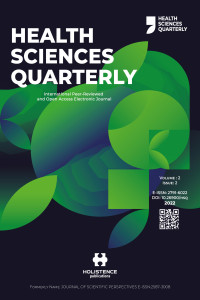Reciprocal regulation of glycogen synthase kinase-3 and β-catenin affects cell proliferation of fructose treated rat hepatocytes
Abstract
High consumption of fructose might lead to obesity, diabetes, and metabolic syndrome in the long term. Recent studies demonstrated the induction of insulin resistance in the liver tissues by down-regulation of insulin signaling pathway elements. Glycogen synthase kinase-3 (GSK-3), one of the insulin signaling elements, suppresses the β-catenin function that is required for cell proliferation and integrity. This study is designed to demonstrate the effects of fructose on the proliferation of rat hepatocytes and its effects on GSK-3 and β-catenin expression. Accordingly, rat hepatocytes were treated with different concentrations of fructose, and cell proliferation was followed with an xCELLigence real-time cell analysis system. Besides, gene and protein expression levels of GSK-3β and β-catenin were evaluated in fructose-treated cells with qRT-PCR and Western blot, respectively. The results demonstrated proliferative effects of fructose at low doses (0-25-50 mM), but cytotoxic properties are pronounced at higher doses (100-150 mM). The IC50 value was calculated as 140±7 mM fructose for Clone-9 cells. Molecular effects of fructose over GSK-3β and β-catenin appeared at gene and protein levels at 100- and 150-mM concentrations at which GSK-3β were suppressed. Conversely, high-dose fructose leads to β-catenin induction as a compensatory mechanism to counteract the antiproliferative effects of fructose at these doses. In conclusion, high-dose fructose-induced cytotoxicity activates a compensatory molecular mechanism involving β-catenin induction which might protect the cells in the long-term fructose exposure. Keywords: Fructose, cytotoxicity, GSK-3β, β-catenin, gene expressionVolume: 2Issue: 22022E-ISSN: 2791-6022https://journals.gen.tr/jspReceived: 2021-03-08Accepted: 2022-03-24ORIGINAL ARTICLEThis work is licensed under a Creative Commons Attribution 4.0 International License.
Keywords
References
- 1. Miller A, Adeli K. Dietary fructose and the metabolic syndrome. Curr Opin Gastroenterol. 2008;24(2):204-9. doi: 10.1097/ MOG.0b013e3282f3f4c4.
- 2. Laughlin MR. Normal roles for dietary fructose in carbohydrate metabolism. Nutrients. 2014;6:3117- 29. doi: 10.3390/nu6083117.
- 3. Taskinen MR, Packard CJ, Borén J. Dietary fructose and the metabolic syndrome. Nutrients. 2019;11(9):1987. doi: 10.3390/nu11091987.
- 4. Castro MC, Massa ML, Arbeláez LG, Schinella G, Gagliardino JJ, Francini F. Fructose-induced inflammation, insulin resistance and oxidative stress: A liver pathological triad effectively disrupted by lipoic acid. Life Sci. 2015;137:1-6. doi: 10.1016/j.lfs.2015.07.010.
- 5. Shi DY, Deng YR, Liu SL, Zhang YD, Wei L. Redox stress regulates cell proliferation and apoptosis of human hepatoma through Akt protein phosphorylation. FEBS Lett. 2003;542(1–3):60-4. doi: 10.1016/s0014-5793(03)00338-7.
- 6. Dragin N, Smani M, Arnaud-Dabernat S, Dubost C, Moranvillier I, Costet P, et al. Acute oxidative stress is associated with cell proliferation in the mouse liver. FEBS Lett. 2006;580(16):3845-52. doi: 10.1016/j.febslet.2006.06.006.
- 7. Duronio RJ, Xiong Y. Signaling pathways that control cell proliferation. Cold Spring Harb Perspect Biol. 2013;5(3):a008904. doi: 10.1101/ cshperspect.a008904.
- 8. Liang RJ, Taylor S, Nahiyaan N, Song J, Murphy CJ, Dantas E, et al. GLUT5 (SLC2A5) enables fructose-mediated proliferation independent of ketohexokinase. Cancer Metab. 2021;9(1):12. doi: 10.1186/s40170-021-00246-9.
- 9. Korkmaz ÖA, Sadi G, Kocabaş A, Yildirim OG, Sumlu E, Koca HB, et al. Lactobacillus helveticus and Lactobacillus plantarum modulate renal antioxidant status in a rat model of fructoseinduced metabolic syndrome. Arch Biol Sci. 2019;71(2):265-73. doi: 10.2298/ABS190123008K.
- 10. Pektaş MB, Sadi G, Akar F. Long-term dietary fructose causes gender-different metabolic and vascular dysfunction in rats: Modulatory effects of resveratrol. Cell Physiol Biochem. 2015;37(4):1407- 20. doi: 10.1159/000430405.
- 11. Cortés-Vieyra R, Silva-García O, Gómez-García A, Gutiérrez-Castellanos S, Álvarez-Aguilar C, Baizabal-Aguirre VM. Glycogen Synthase kinase 3β modulates the ınflammatory response activated by bacteria, viruses, and parasites. Front Immunol. 2021;12:1487. doi: 10.3389/ fimmu.2021.675751.
- 12. Barker N. The canonical Wnt/β-catenin signalling pathway. Methods Mol Biol. 2008;468:5-15. doi: 10.1007/978-1-59745-249-6_1.
- 13. Huelsken J, Behrens J. The Wnt signalling pathway. J Cell Sci. 2002;115(21):3977-8. doi: 10.1242/jcs.00089.
- 14. Yang CM, Ji S, Li Y, Fu LY, Jiang T, Meng FD. β-Catenin promotes cell proliferation, migration, and invasion but induces apoptosis in renal cell carcinoma. Onco Targets Ther. 2017;10:711-24. doi: /10.2147/OTT.S117933.
- 15. Lowry O, Roserbrough N, Farr A, Randall R. Protein measurement with folin phenol reagent. J Biol Chem. 1951;193:265-75.
- 16. Schneider CA, Rasband WS, Eliceiri KW. NIH Image to ImageJ: 25 years of image analysis. Nat Methods. 2012;9(7):671-5. doi: 10.1038/ nmeth.2089.
- 17. Yerlikaya A, Dagel T, King C, Kuwabara M, Lanaspa MA, Andres-Hernando A, et al. Dietary and commercialized fructose: Sweet or sour? Int Urol Nephrol. 2017;49(9):1611-20. doi: 10.1007/ s11255-017-1544-8.
- 18. Hermida MA, Dinesh Kumar J, Leslie NR. GSK3 and its interactions with the PI3K/AKT/mTOR signalling network. Adv Biol Regul. 2017;65:5-15. doi: 10.1016/j.jbior.2017.06.003.
- 19. Zhang HH, Lipovsky AI, Dibble CC, Sahin M, Manning BD. S6K1 Regulates GSK3 under conditions of mTOR-dependent feedback inhibition of Akt. Mol Cell. 2006;24(2):185-97. doi: 10.1016/j.molcel.2006.09.019.
- 20. Liu X, Yao Z. Chronic over-nutrition and dysregulation of GSK3 in diseases. Nutr Metab. 2016;13(1):1-18. doi: 10.1186/s12986-016-0108-8.
- 21. Kaidanovich-Beilin O, Woodgett JR. GSK-3: Functional insights from cell biology and animal models. Front Mol Neurosci. 2011;4:40. doi: 10.3389/fnmol.2011.00040.
- 22. Wu D, Pan W. GSK3: A multifaceted kinase in Wnt signaling. Trends Biochem Sci. 2010;35(3):161-8.
Details
| Primary Language | English |
|---|---|
| Subjects | Health Care Administration |
| Journal Section | Original Articles |
| Authors | |
| Publication Date | April 24, 2022 |
| Published in Issue | Year 2022 Volume: 2 Issue: 2 |


